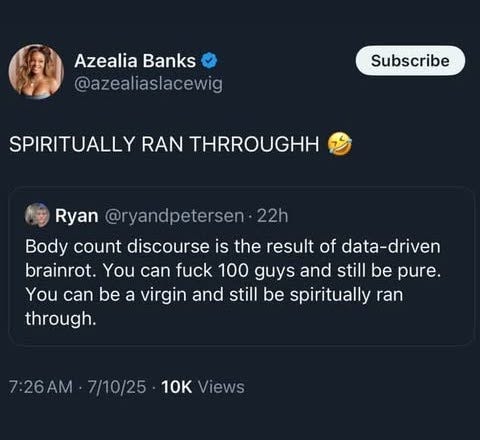Tuesday I went to a birthday party (ice cream sundaes), Wednesday a dinner party (homemade fried chicken), last night I watched The Materialists (finally) at the theater alone. I love the freedom of not having plans (there was nowhere I told someone I’d be) and just on a whim going to see a movie.
At the birthday on Tuesday, Emily told me a story about the difference between jealousy and bitterness. It had to do with a production of Chekhov’s The Seagull on the beach in Shelter Island. Years before. Feeling territorial about recommending the play. Not being invited. Being invited and uninvited by someone peripheral. There was room in the car then there wasn’t. This particular sequence of events fueled an unhinged determination to see the play they were trying to keep her away from. Then, a 7am jitney led to a beautiful time, realizing none of this was about her, but if she felt so territorial about theater maybe she should write a play. And so six years ago, Emily and Leah wrote Slash. Jealousy can be a good motivator. The seed of it, though, can also grow into bitterness and that’s ugly. Nothing good. No Slash.
(Lorenzo Bueno, who Emily was jealous of for staging The Seagull on the beach, has an art show right now about theater, with Max Guy, at Kings Leap. Canal Street Research wrote the press release. ((I feel like you need some of these details, but also that they get in the way. I’m learning how to blog.)))
Emily told me the Seagull story because I’d just gone to Shelter Island.
On the beach there, I read Natasha Stagg’s Grand Rapids three days in a row. It’s a perfect emo summer novel (which will ((ironically?)) be out in the fall). Grief, drugs. Best friends skinny dipping and having sex in two twin beds next to each other. It made me miss Seashell. Fiction or not, it’s hard to be honest about who you are in your writing. Natasha does it, and with such restraint and style.
When I was watching The Materialists I was thinking about Emily in the living room at the birthday party telling her story about jealousy because it’s impossible to watch this movie and not wonder “do people really talk like this?” Emily was, for me, a recent point and counterpoint — an example of someone speaking off-the-cuff better than what a lot of script writers can write, a directness and a saying what she meant that the characters do, but also evidence of a wit, texture, and absurdity the characters in The Materialists seem uninterested in or totally unaware of.
I do think people speak more like the characters in The Materialists than they used to because everyone goes to therapy. There’s something, too, about how people’s faces, especially actors’ faces, show less emotion than they used to, which leads to a demand for more verbal exposition of feeling. There are also other dramatic physical ways to show emotion that now constitute abuse. In old movies, characters throw chairs and smash plates, and often it really strikes me how much acceptable relationship conflict has shifted. That kind of behavior just can’t be a normalized plot point. So, all this makes the cringey dialogue in The Materialists, I guess, contemporary.
The movie was somehow better and worse than I expected. Dakota Johnson’s character is “always doing math.” I saw it in the same theater where I saw Sinners which was also about the characters always doing math. Recession cinema.
Everyone in The Materialists was white.
proposed (in a note) an alternate-reality casting where Dasha Nekrasova’s character was instead played by Durga Chew-Bose. No one is ready for a movie where people talk about value, in terms of the crass marketplace realities of dating, with race being a factor — that “math.”It feels like there are more homeless people everyday in New York.
Next week, I’m part of an ensemble reading of Maya Martinez’s Hole Play on the 16th (the garden of 343A Tompkins Ave). The week after there may be an encore of the Brain Rot conversation I did at New Inc’s Demo with David Lisbon and Bri Griffin; looking like the 23rd, details to come. And on the 29th, I’m part of a reading Max Steele organized at Parkside (317 E Houston St). There are now subscriptions available for The Whitney Review. You can also order through Asterism if you want only issue 005 and not a recurring subscription (they do international shipping).








what is the whitney review